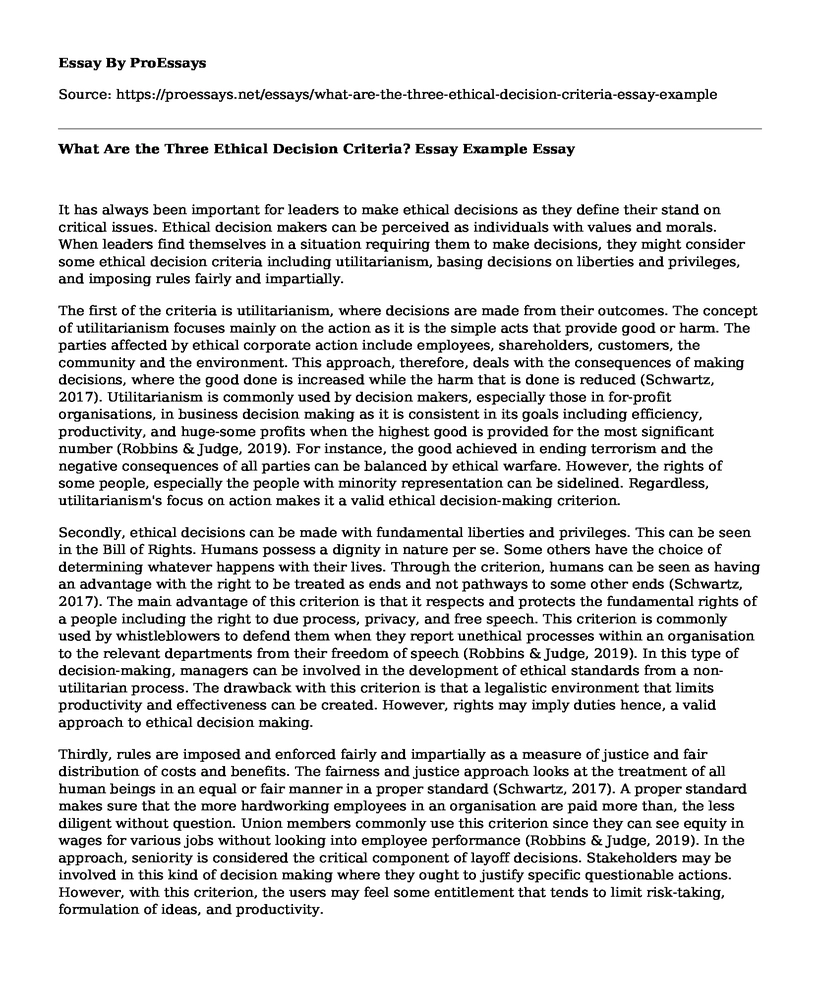It has always been important for leaders to make ethical decisions as they define their stand on critical issues. Ethical decision makers can be perceived as individuals with values and morals. When leaders find themselves in a situation requiring them to make decisions, they might consider some ethical decision criteria including utilitarianism, basing decisions on liberties and privileges, and imposing rules fairly and impartially.
The first of the criteria is utilitarianism, where decisions are made from their outcomes. The concept of utilitarianism focuses mainly on the action as it is the simple acts that provide good or harm. The parties affected by ethical corporate action include employees, shareholders, customers, the community and the environment. This approach, therefore, deals with the consequences of making decisions, where the good done is increased while the harm that is done is reduced (Schwartz, 2017). Utilitarianism is commonly used by decision makers, especially those in for-profit organisations, in business decision making as it is consistent in its goals including efficiency, productivity, and huge-some profits when the highest good is provided for the most significant number (Robbins & Judge, 2019). For instance, the good achieved in ending terrorism and the negative consequences of all parties can be balanced by ethical warfare. However, the rights of some people, especially the people with minority representation can be sidelined. Regardless, utilitarianism's focus on action makes it a valid ethical decision-making criterion.
Secondly, ethical decisions can be made with fundamental liberties and privileges. This can be seen in the Bill of Rights. Humans possess a dignity in nature per se. Some others have the choice of determining whatever happens with their lives. Through the criterion, humans can be seen as having an advantage with the right to be treated as ends and not pathways to some other ends (Schwartz, 2017). The main advantage of this criterion is that it respects and protects the fundamental rights of a people including the right to due process, privacy, and free speech. This criterion is commonly used by whistleblowers to defend them when they report unethical processes within an organisation to the relevant departments from their freedom of speech (Robbins & Judge, 2019). In this type of decision-making, managers can be involved in the development of ethical standards from a non-utilitarian process. The drawback with this criterion is that a legalistic environment that limits productivity and effectiveness can be created. However, rights may imply duties hence, a valid approach to ethical decision making.
Thirdly, rules are imposed and enforced fairly and impartially as a measure of justice and fair distribution of costs and benefits. The fairness and justice approach looks at the treatment of all human beings in an equal or fair manner in a proper standard (Schwartz, 2017). A proper standard makes sure that the more hardworking employees in an organisation are paid more than, the less diligent without question. Union members commonly use this criterion since they can see equity in wages for various jobs without looking into employee performance (Robbins & Judge, 2019). In the approach, seniority is considered the critical component of layoff decisions. Stakeholders may be involved in this kind of decision making where they ought to justify specific questionable actions. However, with this criterion, the users may feel some entitlement that tends to limit risk-taking, formulation of ideas, and productivity.
Conclusion
The utilitarian approach, the rights approach, and the fairness approach often lead to similar answers. Even as problems need to be solved, each of these approaches can help leaders understand the ethical standards of behaviour in different circumstances. Having a criterion for ethical decision making is essential for most leaders. The approaches, however, require a trained sensitivity to ethical issues.
References
Robbins, S. P., & Judge, T. (2019). Organizational Behaviour. New York, NY: Pearson.
Schwartz, M. S. (2017). Business ethics: An ethical decision-making approach. Malden, MA: Wiley Blackwell.
Cite this page
What Are the Three Ethical Decision Criteria? Essay Example. (2022, Jun 06). Retrieved from https://proessays.net/essays/what-are-the-three-ethical-decision-criteria-essay-example
If you are the original author of this essay and no longer wish to have it published on the ProEssays website, please click below to request its removal:
- Competent Organizational Leadership of Coca-Cola Company
- The Situational Analysis and the Strategic Communications Plan Paper Example
- The Development of Leadership in the Early Church - Essay Sample
- Risk and Hazard Management - Research Paper
- Essay Sample on Project Cost Overruns
- Paper Example on Blue Wolf Acquires Neenah: Strategic for Future Ops
- The Great Philosophers: Machiavelli, Plato, Aristotle, Hobbes, and Locke - Free Essay Sample







